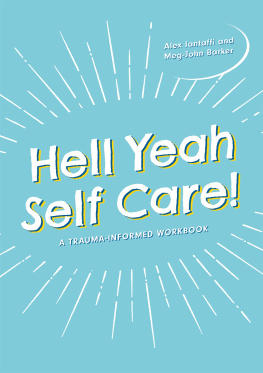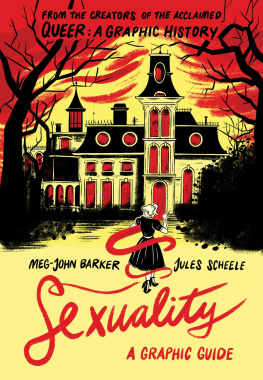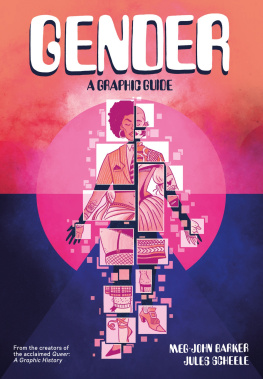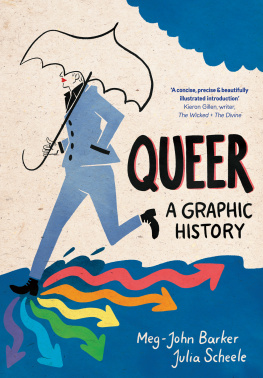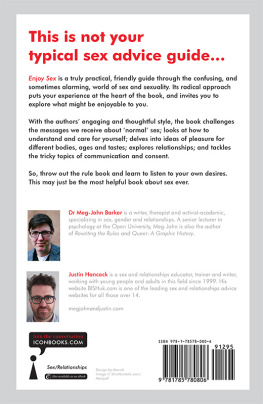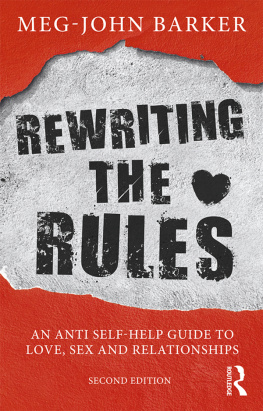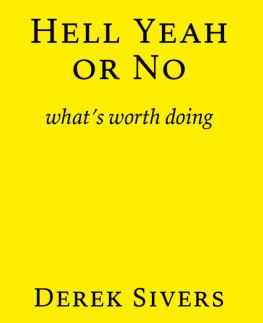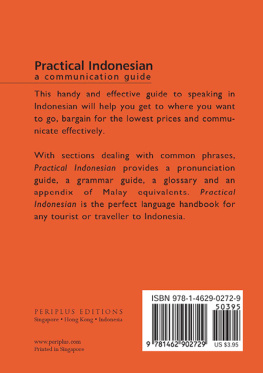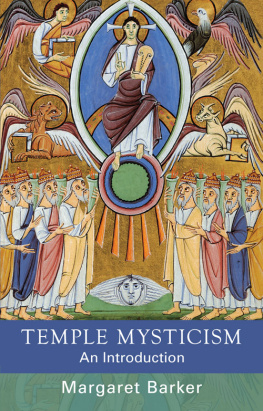Meg-John Barker - Hell Yeah Self-Care!
Here you can read online Meg-John Barker - Hell Yeah Self-Care! full text of the book (entire story) in english for free. Download pdf and epub, get meaning, cover and reviews about this ebook. year: 2021, publisher: Jessica Kingsley Publishers, genre: Religion. Description of the work, (preface) as well as reviews are available. Best literature library LitArk.com created for fans of good reading and offers a wide selection of genres:
Romance novel
Science fiction
Adventure
Detective
Science
History
Home and family
Prose
Art
Politics
Computer
Non-fiction
Religion
Business
Children
Humor
Choose a favorite category and find really read worthwhile books. Enjoy immersion in the world of imagination, feel the emotions of the characters or learn something new for yourself, make an fascinating discovery.
- Book:Hell Yeah Self-Care!
- Author:
- Publisher:Jessica Kingsley Publishers
- Genre:
- Year:2021
- Rating:4 / 5
- Favourites:Add to favourites
- Your mark:
- 80
- 1
- 2
- 3
- 4
- 5
Hell Yeah Self-Care!: summary, description and annotation
We offer to read an annotation, description, summary or preface (depends on what the author of the book "Hell Yeah Self-Care!" wrote himself). If you haven't found the necessary information about the book — write in the comments, we will try to find it.
Hell Yeah Self-Care! — read online for free the complete book (whole text) full work
Below is the text of the book, divided by pages. System saving the place of the last page read, allows you to conveniently read the book "Hell Yeah Self-Care!" online for free, without having to search again every time where you left off. Put a bookmark, and you can go to the page where you finished reading at any time.
Font size:
Interval:
Bookmark:

Hell Yeah
Self-Care!
A Trauma-Informed Workbook
Alex Iantaffi and Meg-John Barker

Why did we write this book? When we looked at the landscape of what workbooks were already out in the world, we felt that many of them targeted specific mental health difficulties, such as depression and anxiety. However, we noticed fewerif anyresources available to help people to think more broadly about care for self and with others, and how to build it into their lives.
We believe that both receiving and giving care is essential to our mental health. At the same time, we take a critical perspective on traditional mental health approaches, which usually individualize problems through diagnosis. We much prefer the concepts of self-care and interdependent care highlighted by black, brown, Indigenous, feminist, disabled, and often trans and queer, scholars and activists. In those frameworks, self-care is a tool for survival, so that we can engage in the struggle for liberation again and again. We also acknowledge, throughout this book, that many of our struggles are systemic and rooted in structural inequalities, oppression, colonialism and repression of life and vitality.
No matter where we are or who we are, care can be pretty counter-cultural, especially when by care we mean interdependent care, in a world that pushes us to go faster, buy more and get ahead of others. In our experience, we/people struggle with care for self and others, no matter what our mental health labels might be. So it seemed to make sense to combine our work in this area and bring youthe readera workbook about care.
Care, of self and others, can sustain us in times of crisis and trauma. However, it can only do so if its already embedded in our lives and communities. Many people already know how to do this. Many people dont. If you lean towards the dont side, this book might be for you. If, as youre reading this, you find yourself feeling angry, thats good. There is a lot to be angry about in the world right now, and anger is mobilizing, it moves us towards actions. Too often, though, weve experienced people turning that anger in towards themselves. This could be because it wasnt safe to turn that anger outwards, at home, at school or in the wider world.
If you notice being angry about a book about self-care, take a moment to pause, breathe and ask yourself: Where is that anger coming from? Is it easier to direct that anger at us, or this book, because directing it at the world can feel so overwhelming? If thats the case, thats OK. After all, why are we talking about self-care in the apocalypse, right? Isnt self-care just selfish and privileged? Well, this is complicated. Taking care of self and others does require a certain amount of privilege, in terms of energy, support, access to finances and resources. This is true and we address this in the book again and again.
However, we do not think that truly caring for ourselves is inherently selfish. Were not talking about self-indulgence, and oh go on, buy that gadget or those chocolates, you deserve it, in this book. If that is your self-care, thats fine. This is not what were talking about here, its not care as consumption. Weve written this book because we believe we truly are all essential. And, if we are essential to the movement for liberation, we need to take care of ourselves and one another, as an integral part of the struggle, not as an afterthought. How can we fight the system when were exhausted? How can we be effective in building community if were so traumatized and reactive that we end up isolated or lashing out at our accomplices?
If were marginalized, we need care to continue existing, knowing that our existence is resisting a dominant culture that wants us dead or so exhausted that they can easily push us aside. If were privileged, can we be fully aware of what our agency is, and use that privilege to join the fight as full participants and as daring accomplices, as Indigenous activists have called on us to be? If were a mixture of the two, as many of us areprivileged in some areas and marginalized in otherscan we imagine a world of interdependent care, mutuality and kinship?
We wrote this book because we dont believe that suffering is in itself moral. If were privileged, suffering will not purge or redeem us in some way from our unearned power in the world. This seems to us a colonial, Christian and puritanical way to view suffering. We do, however, believe in the vision that, as we stated earlier, many black, brown, Indigenous, feminist, disabled, and often trans and queer, scholars and activists have woven across time and space. This is a vision of liberation, of mutuality, of interdependence, of right relationships, of justice and of care. This is but a small offering to those ideals, to those visions, to those yearnings within us and in our communities.
So who are we to be writing a book like this? Always a good question to ask ourselves! We are both therapists, although one of us (Alex) sees clients and was trained in somatic, as well as talk therapy, and the other one (MJ) has moved towards offering writing mentorship services these days. It seems important to name this, given that part of our educational backgrounds, and our day-to-day work, is focused on care. Were also people who live with the legacy of developmental trauma and experience chronic and acute health conditions and disabilities. Were activists, community organizers and people interested in healing, justice and liberation movements. This means we think about care a lot, from many perspectives, for ourselves and with others. Care for self and others is part of our everyday lives, personally and professionally. Therefore, we hope that the range of academic, activist, therapeutic, personal and spiritual perspectives that we bring together do provide a lot of food for thought.
We want to be clear that were not always brilliant at self-care. In fact, we struggle with it, in a range of ways. We dont always do all the things that are supportive of ourselves and others. There are many reasonssome individual and some systemicwhy its not always easy to care for ourselves and other people. We invite you to explore this for yourselves throughout the book. We want to share this point here because we dont want to give the impression that weve got this all figured out. We struggle with care, just like you probably do, if youve picked up or have been given this book. We share our struggles, and some solutions and approaches that weve found helpful for ourselves, our clients and communities, in our combined nine decades of life, across three different countries. We hope this offering is of use to you.
This is a great question, and you probably have a better answer for this one than we do! However, if we think about who our intended audience is, this is what we had in mind.
Our workbook is really for anyone interested in care. You might be a therapist, healer, community organizer, activist, teacher, a person living communally, an artist, someone struggling with mental health issues, or just someone who is interested in care, and who maybe doesnt know where to start, or who has tried everything out there already.
We hope that this workbook will be useful to you, wherever you are in the world. However, because of who we are and where we live, we also acknowledge that, despite our efforts, this workbook will, inevitably, mostly appeal and apply to Western audiences who speak English. Therefore, it might be most relevant to readers in the UK and US, as well as Australia, New Zealand, Canada and Western Europe. We understand that this workbook may be less applicable in countries beyond these, due to different cultural understandings of the self (although these will certainly be touched on, and challenged, through this workbook).
Font size:
Interval:
Bookmark:
Similar books «Hell Yeah Self-Care!»
Look at similar books to Hell Yeah Self-Care!. We have selected literature similar in name and meaning in the hope of providing readers with more options to find new, interesting, not yet read works.
Discussion, reviews of the book Hell Yeah Self-Care! and just readers' own opinions. Leave your comments, write what you think about the work, its meaning or the main characters. Specify what exactly you liked and what you didn't like, and why you think so.

